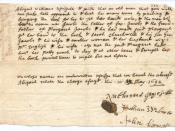For most people, with the word "Puritanism" comes the idea of modesty, a strong belief in God and Jesus, purity, and living according to the Bible. However, in Arthur Miller's play "The Crucible", despite the fact that teenaged Abigail Williams lives in a Puritan household, she proves to be deceitful and vain. Literary critic Wendy Schissel suggests that Abigail could not have been capable of seducing John Proctor, a married man whom she has had an affair with, because she had not been exposed to any sexuality as a Puritan girl. However, throughout the play, Abigail not only participates in, but also initiates, a series of lies and malicious acts in order to save herself and gain respect from people around her. She proves to be too smart for her own good, and just as she quickly figures out what benefits her in certain situations, that same intelligence and hungriness for power could have easily helped in her seduction of John Proctor.
Abigail Williams is, first and foremost, a liar behind an innocent disguise. At the conclusion of Act One, many adults, including her uncle Reverend Parris, are unsure if Betty, his daughter, is under the influence of the Devil. She is lying inert and had been dancing in the woods with Abigail and others. Abigail can see how worried the adults are that the girls have turned into witches; it does not take long for her to realize that if she pretends to confess to reluctance to the Devil, she will be seen as virtuous and righteous. She cries, "I want to open myself! I want the light of God! [...] I danced for the devil; [...] I wrote in his book; I go back to Jesus; I kiss His hand" (Miller, page 50). However,


